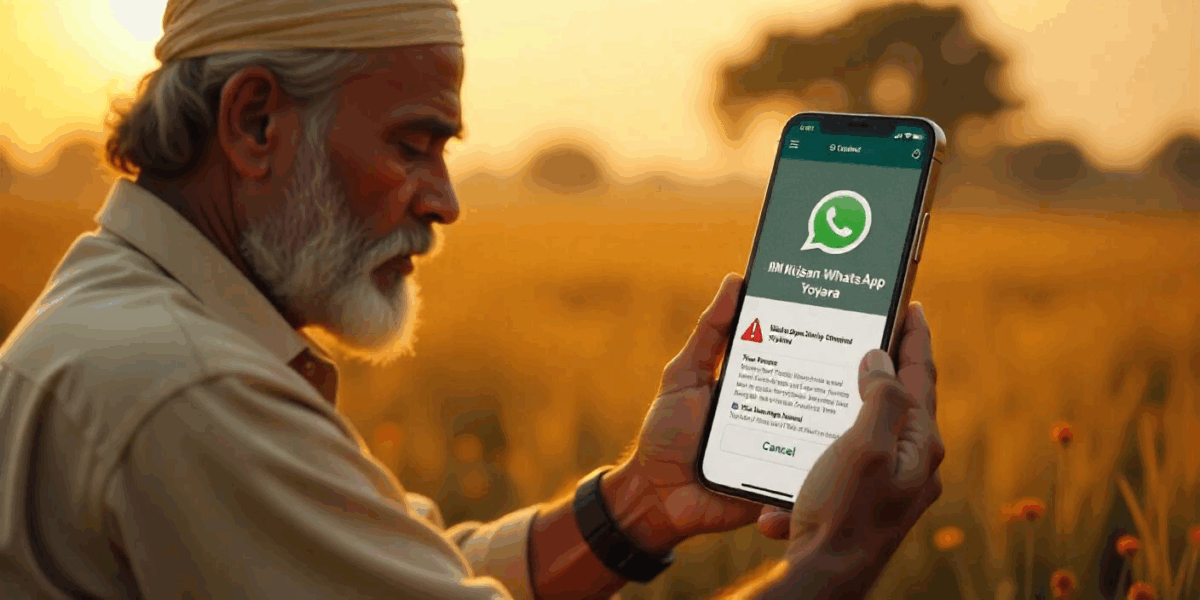Imagine a farmer waiting for the next installment of ₹2,000 under the PM Kisan Samman Nidhi Yojana, a genuine financial lifeline for millions across India. Suddenly, he receives a WhatsApp message claiming to be from the PM Kisan department, asking you to verify your Aadhaar or update bank details to avoid missing your payment.
What are the chances that he would click? A lot, and that’s exactly what cybercriminals are counting on.
In recent months, a growing number of farmers have reported falling victim to the PM Kisan WhatsApp scam, where fraudsters use the name of this central government scheme to send fake messages and steal sensitive personal and financial information.
The scam is widespread and designed to deceive, especially targeting small and marginal farmers who may not be fully aware of how digital fraud works.
This isn’t just a random cybercrime, it’s a calculated attack on vulnerable rural citizens who trust government schemes and rely on WhatsApp for communication.
This article uncovers the tactics used by scammers, signs of fake messages, and steps farmers can take to stay safe.
What is the PM Kisan WhatsApp Scam?
In this scam, the scammer generally reaches out to people, claiming to be government officials from the PM Kisan department. They generally reach out on WhatsApp, offering benefits, new scheme registration, etc.
The message contains a suspicious link and asks for personal information like Aadhar card and PAN card, followed by an OTP.
Once the person shares that information, the scammer gets access to the bank account, resulting in financial fraud.
Other times, scammers, after collecting personal details, led to more dangerous identity theft scams and misuse the details to execute bigger frauds & crimes.
How the Scam Operates
These scams usually begin with a message that includes the following:
- A fake claim that a new PM Kisan installment is ready
- A request to update Aadhaar, bank details, or complete e-KYC
- A suspicious link redirecting to a lookalike government website
- Urgent language to create panic and push immediate action
Some versions of the scam also involve voice or video calls to “verify” the identity of the beneficiary.
This tactic is increasingly being reported, and it aligns with concerns around the WhatsApp video call scam trend, where victims unknowingly expose their surroundings, faces, or private data.
Why is This Targeting Farmers?
Farmers are increasingly becoming smartphone users, often trusting WhatsApp for official updates and group communication. However, the lack of awareness about cybercrime leaves them vulnerable.
Scammers exploit this digital gap, using fear and urgency as tools to manipulate their victims.
It’s important to understand that legitimate government departments will never ask for sensitive information through WhatsApp.
If you receive a link or are prompted to share bank details, it is most likely a scam.
How to Identify a Scammer on WhatsApp?
Here are some common traits:
- Unwanted messages with government logos or seals
- Fake promises of additional funds or bonuses
- Messages asking you to share your WhatsApp registration code
- Urgent instructions with links to suspicious websites
- Calls pretending to be from Kisan Helpdesk or support teams
How to Protect Yourself from the PM Kisan WhatsApp Scam
Cyber fraudsters are smart, but a few tactics can prevent you from falling into their tricks. Here are some of the ways:
- Do not click on any link or download any attachment.
- Do not share any personal information or OTP, even if the message seems legitimate.
- Verify through the official PM Kisan portal.
- Block and report the number on WhatsApp.
- Inform local authorities and register with us to report a complaint on the online portal.
If you feel your WhatsApp account might be compromised, log out from all devices and re-verify using your registered number.
Never share your WhatsApp code with anyone—not even someone claiming to be a government representative.
Final Thoughts
The PM Kisan WhatsApp scam is a stark reminder that even welfare schemes meant for rural upliftment can become tools for fraud in the hands of cybercriminals.
Awareness is the first step in prevention. As digital fraud continues to evolve, every citizen must stay informed and cautious, especially those new to smartphones and internet-based services.
Always verify before you trust. Because in today’s world, a single click can cost much more than just money—it can cost your digital identity.







